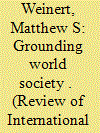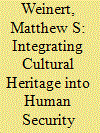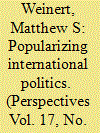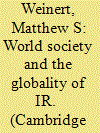|
|
|
Sort Order |
|
|
|
Items / Page
|
|
|
|
|
|
|
| Srl | Item |
| 1 |
ID:
075919


|
|
|
|
|
| Publication |
New York, University College London Press, 2007.
|
| Description |
xi, 243p.
|
| Standard Number |
9780415771689
|
|
|
|
|
|
|
|
|
|
|
|
Copies: C:1/I:0,R:0,Q:0
Circulation
| Accession# | Call# | Current Location | Status | Policy | Location |
| 052178 | 320.15/WEI 052178 | Main | On Shelf | General | |
|
|
|
|
| 2 |
ID:
153254


|
|
|
|
|
| Summary/Abstract |
The concept of world society has elicited sharp criticism for being too diffuse and amorphous owing to its synonymy with all transborder social relations, equability with humankind, or conflation with solidarist international society. To overcome these shortcomings, this article reconfigures world society by attaching otherwise unmoored social activity to an understanding of the world as comprised of shared social spaces. This spatialised reading foregrounds constellations of relations that have emerged in conjunction with discrete geographies – natural, economic, cyberspatial, cultural, anthropic – within which humans interact, and demonstrates that the world has become an actionable, political concept generative of activities peculiar to the space itself. A review of English School literature extracts four theses – purposive, plural, spatial, and stewardship – that invite conceptual reconstruction of world society. The article then addresses the discursive construction of cultural heritage as a worldly space populated with distinctive institutions and cognitive and normative commitments, and is followed by reflections on the added value of such an approach and directions for future research.
|
|
|
|
|
|
|
|
|
|
|
|
|
|
|
|
| 3 |
ID:
184093


|
|
|
|
|
| Summary/Abstract |
The UN Development Programme introduced the human security concept in 1994 to address the diversity of challenges to people’s survival, livelihood, and dignity in seven key areas: personal, food, health, economic, political, community, and environmental security. A voluminous literature has since engaged its definitional parameters, theoretical implications, and practical applications. Yet neither dignity nor community security, defined in part to include cultural traditions and identities, have attracted much attention despite considerable human and community insecurities caused by assaults on cultural heritage which, as emblematic of distinctive cultural identities, have downward effects on dignity. This article aims to correct that gap. It identifies and examines three security markers to ascertain and redress the sufferance of indignities and insecurities pertaining to heritage, dignity, and community security: ensuring use of heritage; promoting its transmission; and protecting and advancing cultural rights.
|
|
|
|
|
|
|
|
|
|
|
|
|
|
|
|
| 4 |
ID:
090274


|
|
|
| 5 |
ID:
110473


|
|
|
|
|
| Publication |
2011.
|
| Summary/Abstract |
The pluralist-solidarist debate in English School theory - which concentrates on discerning the kind of international society in which we live - encourages overgeneralisations that either overstate international society's presumed solidarity or vigorously defend instrumental commitments that underplay actual ethical advances. Building upon insights by Bellamy, Buzan and Hurrell, I attempt to extricate the debate from its current impasse by recasting pluralism and solidarism as ideal-typical assessments of agreements within particular issue areas. The argument is illustrated with reference to human security. Two reasons are behind this choice. Firstly, it allows me to pose more pluralist-friendly claims on a terrain that is presumably ceded to solidarists. Secondly, the contested nature of human security allows me to highlight the fluidity of the concepts, which reveals not necessarily solidarism's cooperative potential or pluralism's minimalist pledges, but rather fissures, uncertainties and dissonances that in the end are resolved by continual mediations between the two.
|
|
|
|
|
|
|
|
|
|
|
|
|
|
|
|
| 6 |
ID:
177600


|
|
|
|
|
| Summary/Abstract |
Diogenes the Cynic famously declared that he was a kosmou politês—a citizen of the world. No doubt a radical proposition as much for ancient as it is for modern ears, Seneca understood the claim not as erasing local sources of identity, political action, and ethical obligation, but as enriching them and, importantly, constraining their worst manifestations, since our common humanity requires that we not injure ‘its fundamental ingredients’ of reason and moral choice. As such, the kosmou politês ‘is the ancestor and source of Kant’s idea of the “kingdom of ends” ‘which enjoins us ‘to treat with equal respect the dignity of…every human being’ (Nussbaum 2002, 7–8).
|
|
|
|
|
|
|
|
|
|
|
|
|
|
|
|
|
|
|
|
|